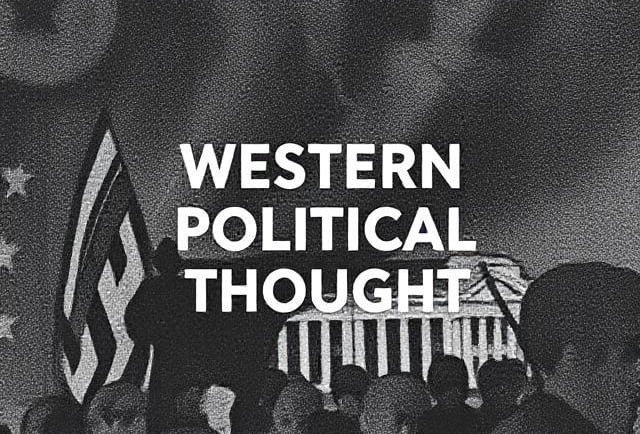UPSC Mains PSIR: Trace the evolution of Western Political Thought from ancient to contemporary period. (20 m- 2020)
In this post, we trace the development of Western Political Thought through its major phases – Ancient, Medieval, Modern, and Contemporary, highlighting the key thinkers, ideas, and transitions that have shaped political theory in the West. From the virtue ethics of Plato and Aristotle, the religious-political synthesis of St. Augustine and Aquinas, to the individualism and liberalism of Hobbes, Locke, Rousseau, and the critical theories of Marx, Rawls, and Foucault – this answer offers a comprehensive and analytical approach tailored for UPSC aspirants.
PSIR
7/26/20252 min read


“Political theory is a never-ending debate between theorists across space and time.” – Andrew Hacker
Western Political Thought has evolved over centuries—from the moral inquiries of Greek philosophers to the critical theories of the modern age. It reflects how politics, ethics, society, and power have been debated, reimagined, and redefined through changing historical contexts.
🏛️ Ancient Period: Foundations of Western Political Thought
The Greek philosophers laid the earliest foundations:
Socrates viewed ethics and politics as inseparable.
Plato, his disciple, envisioned an ideal state ruled by philosopher-kings, rooted in justice and the division of society into classes.
Aristotle, more pragmatic, considered politics a practical science. He is regarded as the Father of Political Science for bringing empirical observation and ethics into politics.
Both thinkers saw the State and Community above the individual, which also led to limitations such as justification of slavery and hierarchical social order.
🔎 Methods like dialectics and logical reasoning (inductive & deductive) were developed to understand politics philosophically.
✝️ Medieval Period: Religion and Political Thought
Often called the "Dark Ages", this era saw politics heavily influenced by Christian theology:
St. Augustine and St. Thomas Aquinas tried to reconcile faith with reason.
The Church dominated politics, but thinkers still contributed to political theory within theological frameworks.
🔄 This period emphasized divine right and obedience, overshadowing classical human-centric ideals.
🌅 Renaissance to Early Modern Period: Rebirth of Secular Political Thought
With the Renaissance and Reformation, political thought saw a major shift:
Machiavelli broke from idealism. His "The Prince" introduced realism in politics, viewing power and statecraft as distinct from morality.
His work laid the groundwork for modern political realism and shaped later ideas on state autonomy.
🧑🤝🧑 Modern Period: Contractualism and Liberalism
The Enlightenment ushered in rationalism, individualism, and liberalism:
Hobbes, Locke, and Rousseau developed the Social Contract Theory.
Hobbes advocated a strong state to avoid chaos.
Locke focused on natural rights and private property.
Rousseau emphasized general will and popular sovereignty.
🟢 These ideas led to the rise of liberal democracy, individual rights, and constitutionalism.
J.S. Mill added the dimension of Utilitarianism, advocating liberty, freedom of thought, and women's rights.
⚙️ Critique of Capitalism: Rise of Socialism & Marxism
With Industrial Revolution came exploitation and inequality:
Karl Marx introduced Scientific Socialism, analyzing class struggle through dialectics.
He argued the capitalist state was rooted in exploitation and proposed a classless, stateless society through revolution.
📚 Later, Neo-Marxists like Gramsci introduced cultural hegemony, showing how ideology maintains dominance through consent, not just force.
🌍 20th Century: Justice, Totalitarianism & New Directions
After two World Wars, political theory shifted focus:
Hannah Arendt warned of the dangers of totalitarianism and emphasized political action.
John Rawls offered a new vision with his Theory of Justice:
Equal liberties
Fair equality of opportunity
Difference Principle to support the least advantaged.
💡 Libertarians like Hayek and Nozick responded by defending individual liberty and free markets.
♀️ Contemporary Period: Feminism, Subalternity & Postmodernism
New voices began challenging traditional Western canon:
Feminists like Simone de Beauvoir and Judith Butler questioned gender norms and highlighted social construction of identity.
Michel Foucault analyzed the link between power and knowledge, exploring how societies discipline individuals.
Subaltern theorists like Fanon, Spivak, and Bhabha critiqued colonialism and demanded a decolonized political discourse.
🧭 Conclusion: A Journey Still Evolving
Western Political Thought has constantly evolved by responding to crises, questioning existing structures, and accommodating new voices.
🔁 As Professor Sabine said, "Its history has no concluding chapter."
Today, there’s a growing need to go beyond Western vs Eastern binaries and embrace a pluralistic political imagination. Political thought must now reflect global realities, drawing from diverse cultures and traditions to remain inclusive and vibrant.
📝 Relevance for UPSC Mains:
This evolution forms the backbone of GS2 (Governance, Constitution, Political Theory) and PSIR Optional.
Understanding this trajectory helps frame better answers on ideology, rights, justice, democracy, and power.